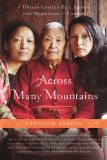Summary | Excerpt | Reviews | Beyond the book | Read-Alikes | Genres & Themes | Author Bio

A Novel
by Galsan TschinagIn the high Altai Mountains of northern Mongolia, the nomadic Tuvan people’s ancient way of life collides with the pervasive influence of modernity as seen through the eyes of a young shepherd boy.
The debut of a major voice in contemporary world literature.
In the high Altai Mountains of northern Mongolia, the nomadic Tuvan people’s ancient way of life collides with the pervasive influence of modernity as seen through the eyes of a young shepherd boy. The confrontation comes in stages. First his older siblings leave the family yurt to attend a distant boarding school. Then the boy’s grandmother dies, and with her the boy’s connection to the tribes. But the greatest tragedy strikes when his dog, Arsylang—“all that was left to me”—dies after ingesting poison set out by the boy’s father to protect his herd from wolves. “Why is it so?” he cries out in despair to the Heavenly Blue Sky, but he is answered only by the silence of the wind.
Rooted in the oral traditions of the Tuvan people and their epics, Galsan Tschinag's novel weaves the timeless story of a boy poised on the cusp of manhood with it the tale of a people's vanishing way of life.
Galsan Tschinag's autobiographical story of a boy living on the Mongolian steppes (prairies) in the 1950s offers an evocative glimpse into a way of life in which the nomadic people live in harmony with their awesome (in the literal sense) surroundings, worshiping the sky as sacred. It is a record of a time that was already vanishing (but, thanks in part to Tschinag and others, is now being not just preserved but lived once again)...continued
Full Review
 (929 words)
(929 words)
(Reviewed by BookBrowse Review Team).
To reach the homeland of the Tsengel Tuvans one has to travel to the furthest western corner of Mongolia, to the High Altai mountains to a province the size of the Netherlands, bordering China. More than 90% of the population of the area are Kazakh Muslims, the remaining 10% are Khalkh, Urinakhai, Khoshuud and Tuvans.
The Tuvans are a Turkic-speaking people (i.e. their spoken language belongs to the Turkic family; other Turkic speaking countries include Kazakhstan, Uzbekistan and, of course, Turkey). Today, about 4,000 of Mongolia's approx 2.3 million population identify themselves as Tuvan. Tschinag writes in The Caravan that the Mongolian majority's regard for the Tuvans brings to mind the Chinese's regard for the Tibetans or the Russians ...

If you liked The Blue Sky, try these:

by Yangzom Brauen
Published 2012
An extraordinary portrait of three generations of Tibetan women whose lives are forever changed when Chairman Mao's Red Army crushes Tibetan independence.

Message from an Unknown Chinese Mother
by Xue Xinran
Published 2012
Message from an Unknown Chinese Mother is powered by love and by heartbreak and will stay with readers long after they have turned the final page.
Never doubt that a small group of thoughtful, committed people can change the world...
Click Here to find out who said this, as well as discovering other famous literary quotes!